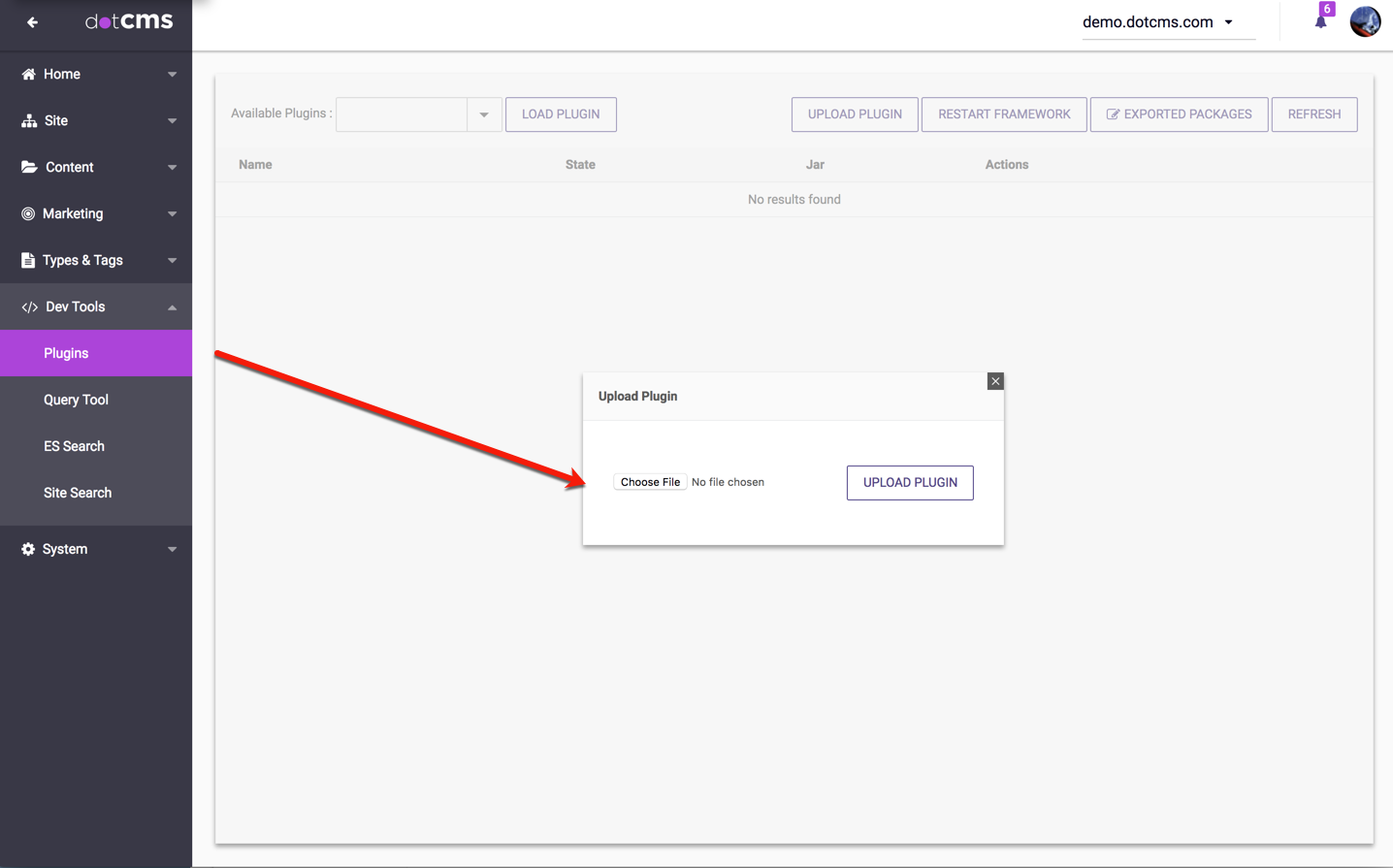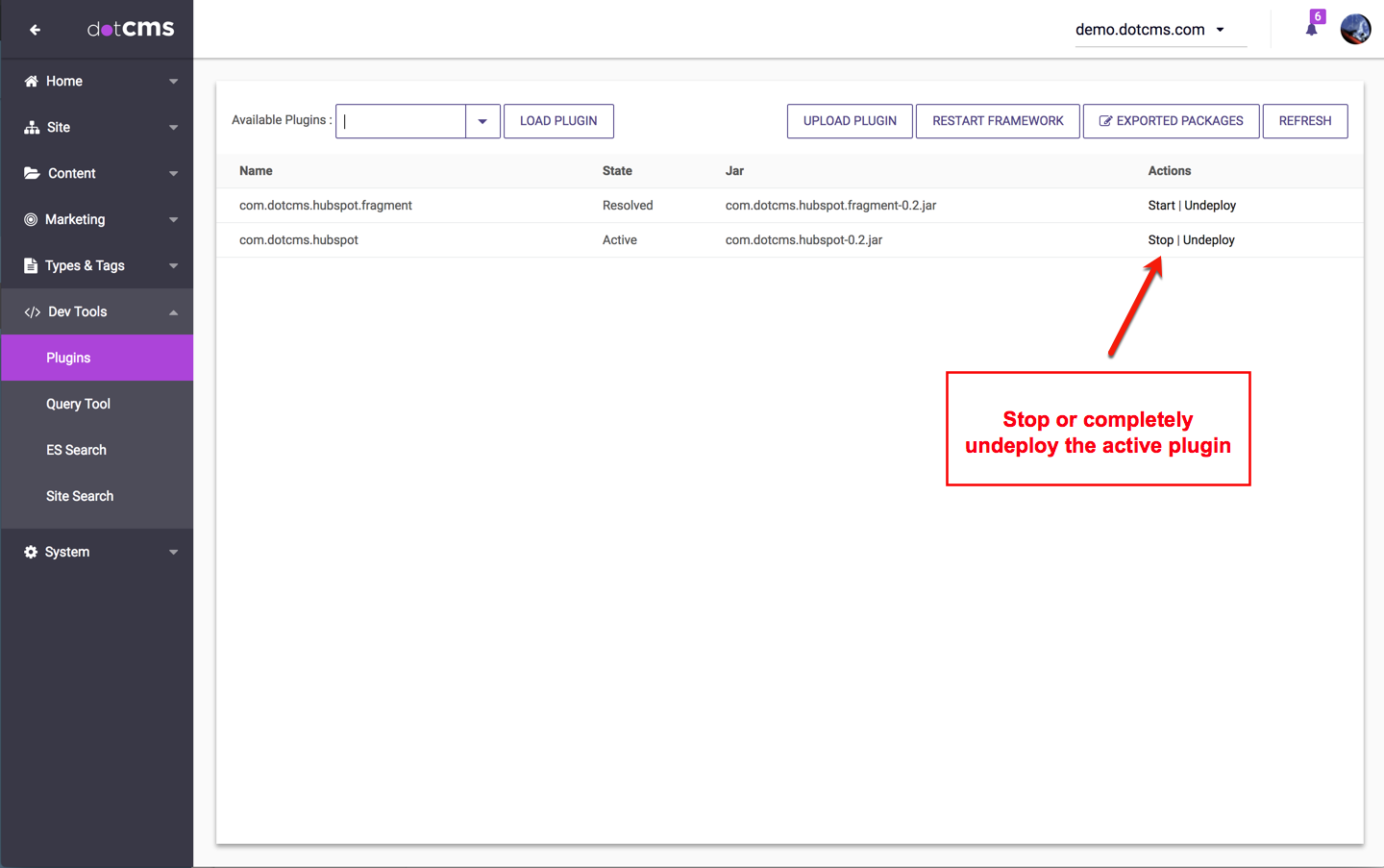dotCMS allows the tracking, logging, and customized actions, based on push publish events as they occur. Customizations to these event listeners can be activated and managed via the OSGI plugins manager under “Dev Tools” on the dotCMS backend UI.The following event listeners can be configured:
AddedToQueueEvent.java: Listener for push publishing events added to the push publishing queueAllEndpointsFailureEvent.java: Push publishing has failedAllEndpointsSuccessEvent.java: Push publishing has succeededPushPublishEndEvent.java: Push publishing event has endedPushPublishStartEvent.java: A push publishing event has startedSingleEndpointFailureEvent.java: Push publishing has failed on a specific endpointSingleStaticPublishEndpointSuccessEvent: Push publishing has succeeded on a specific endpoint
Plugin Github Repository
The github plugin directory where you can download the com.dotcms.pushpublish.listener plugin is: https://github.com/dotCMS/plugin-seeds.git
Inside the com.dotcms.pushpublish.listener, in the following path: com.dotcms.pushpublish.listener/src/main/java/com/dotcms/pushpublish you will find Activator.java and a listener folder with some example java classes that activate the listeners. Modify the Activator.java file and add the java files for the listeners that you wish to activate and customize behavior for inside the /listener directory.
Subscribing to Push Publishing Events
There are two ways to subscribe to Push Publishing events:
1) Implementing EventSubscriber.java as in the following example: https://github.com/dotCMS/plugin-seeds/blob/master/com.dotcms.pushpublish.listener/src/main/java/com/dotcms/pushpublish/listener/SuccessEndpointsSubscriber.java
package com.dotcms.pushpublish.listener;
import com.dotcms.pushpublish.util.EventUtil;
import com.dotcms.system.event.local.model.EventSubscriber;
import com.dotcms.system.event.local.type.pushpublish.AllPushPublishEndpointsSuccessEvent;
public class SuccessEndpointsSubscriber implements EventSubscriber<AllPushPublishEndpointsSuccessEvent> {
public void notify(AllPushPublishEndpointsSuccessEvent event) {
EventUtil.logAllEndpointsSuccessEvent(event, this.getClass());
}
} //SuccessEndpointsSubscriber.
- OR -
2) Using @Subscriber annotation in the method that configures the action to be executed. Example: https://github.com/dotCMS/plugin-seeds/blob/master/com.dotcms.pushpublish.listener/src/main/java/com/dotcms/pushpublish/listener/PushPublishStartSubscriber.java
package com.dotcms.pushpublish.listener;
import com.dotcms.pushpublish.util.EventUtil;
import com.dotcms.system.event.local.model.Subscriber;
import com.dotcms.system.event.local.type.pushpublish.PushPublishStartEvent;
public class PushPublishStartSubscriber {
@Subscriber
public void notify(PushPublishStartEvent event) {
EventUtil.logBasicEvent(event, this.getClass());
}
} //PushPublishStartSubscriber.
It is EXTREMELY IMPORTANT to remember to include the unsubscriber method for every listener in the Activate.java file so that if the plugin is shut down thru the UI, that the listener will also be shut down. Otherwise, the listeners will keep running, even after the plugin is undeployed. Both of these subscription implementation methodologies have the same behavior.
How to Deploy the Push Publishing Listeners Plugin
Once you have modified the Activator.java and added the java files to the listener directory, then run ./gradlew jar which will create the com.dotcms.pushpublish.listener-0.1.jar file that you can upload and deploy from the dotCMS backend UI under Dev Tools -> Plugins.
After activating the plugin, the plugin can also be either stopped or undeployed completely.




